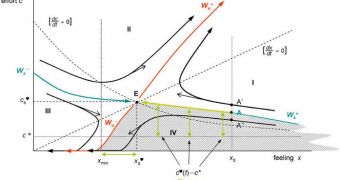Though it may seem a bit counterintuitive at first, mathematics can indeed explain some aspects of love. A researcher in Spain managed, for instance, to create an advanced theoretical model that is capable of explaining – at least in part – why divorce and break-up rates are continuously rising in the United States and the United Kingdom, as well as in other developed nations. The new model of “sentimental dynamics” is based on the second law of thermodynamics, and shows the importance of placing work and effort into making a long-term relationship work, PhysOrg reports.
The model produces new evidence to support existing studies and sociological data on the number of marriages and couples that break up. There are very few people who get married knowing that things are not going to work from the get-go. The vast majority of couples who make the leap are convinced that they love each other, and pledge to do their best to make the relationship work for many years. However, despite these pledges and feelings, divorce and break-up rates continue to increase.
Some researchers propose that one of the main causes for this is the fact that more women take on more well-paid jobs. Another reason may be the economic recession we have all been experiencing. But none of these reasons, or any others, can explain the negative trend in marriage success rates. The new model, which was developed by Universidad Complutense in Madrid mathematician Jose-Manuel Rey, says that couples everyone believes are going to last forever are very likely to break up. This is what Rey calls “the failure paradox.” On the other hand, the most likely-to-succeed couples are those who exhibit a tolerable “gap.”
This term in used to refer to the difference that occurs in reality between the optimal amount of effort each couple member should put in the relationship, and the actual amount they put in. According to Rey, the “second thermodynamic law for sentimental interaction” basically states that a relationship will deteriorate unless efforts are put in to keep it going. Another conclusion Rey highlights is the fact that it's better and easier to work on a relationship while everything is going well, rather than relaxing, and then finding yourselves in a position where you have to mitigate potentially-irreparable damage.

 14 DAY TRIAL //
14 DAY TRIAL //